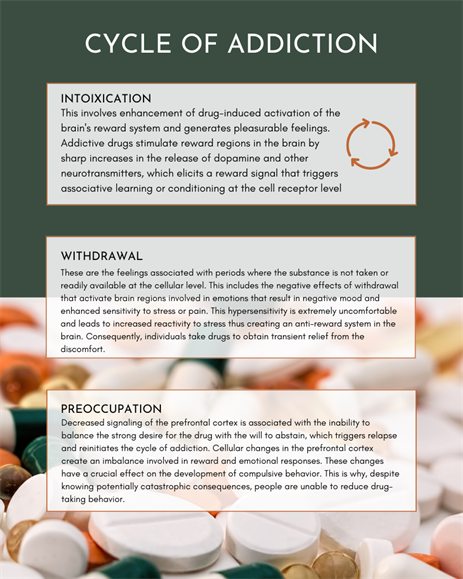Published
on
August 25, 2022
| 1,978 views
| 1 follower
members are following updates on this item.
 “Addiction is a complex disease of a complex brain” – The Lancet Psychiatry.
“Addiction is a complex disease of a complex brain” – The Lancet Psychiatry.
What causes addiction?
There are a number of reasons why someone may develop substance use and other addiction disorders. Addiction does not discriminate and can impact anyone regardless of age, gender, race, or socioeconomic status. However, 55-99% of patients in substance abuse treatment have reported traumatic experiences related to sexual abuse, neglect, emotional abuse, physical harm, a series of negative life events, and other traumatic events.
Another key driver is the misuse of prescription pills and other legal substances that are addictive. Pain management is a complicated process – simple mistakes taking controlled substances can lead someone down the path towards a substance use disorder. Patients may become dependent on pain relievers and transition to illicit substances after they have exhausted all prescription refills. This often happens quickly and unexpectedly, with devastating consequences.

How is addiction affecting our state?
In 2017 Governor Walker issued a declaration of public health disaster emergency for Alaska. According to the Alaska Department of Health and Social Services, the year 2017 saw the highest number of opioid-related deaths at 108; of which 100 (93%) were due to overdose. Additionally, 2017 saw a decline in the life expectancy in the United States, and many theories point to the dramatic rate in opiate related overdoses as a primary driver in reversing the decades-long trend of increasing life expectancy. Life expectancy declined during that time period not because 70 year-olds were dying before they turned 71, but instead because 20 to 30 year olds were dying of heroin overdoses. More recently during the pandemic, early data demonstrates that rates of drug misuse and overdose continue to rise, at a faster pace here in Alaska compared to the rest of the nation.
Whether or not you have a personal experience with addiction, you are not immune to its toll on our community. In 2018 the estimated annual substance misuse related economic cost to Alaska reached $3.45 billon. Approximately $2.39 billon (69% of total costs) were due to alcohol misuse; the remaining $1.06 billion (31%) were associated with drug misuse.
What is Medication Assisted Treatment?
Addiction medicine offers coordinated care to help patients overcome substance use disorders and addiction as part of a comprehensive approach to wellness. As part of a harm reduction approach, addiction medicine shifts the recovery attitude from moral failure to a symptom of previous trauma, focused on identifying and treating conditions that lead to substance use in the first place.
By administering medications such as buprenorphine, addiction-trained physicians can treat opioid use disorders by reducing the craving to use drugs and relive withdrawal symptoms. Buprenorphine binds more tightly at the body’s opiate receptor sites than any other opiates such as heroin, giving it the ability to expel existing opioids and block others from attaching. This action is enough to stop the withdrawal symptoms, but not enough to cause intense euphoria. Over time this decreases the patient’s craving to use, and has demonstrated a reduction in overdose death as well as improved rates of long-term recovery.
TVC Addiction Medicine
TVC Addiction Medicine offers comprehensive evaluations and treatments for a full range of addiction medicine services for teens and adults. We have addiction-trained physicians and licensed addiction therapists who provide evidence-based treatments and care that is tailored to meet the patient’s individual needs.
If you know of someone in need of addiction medicine services, please call 907-458-2634.
Peter Dillion, MD, FAAFP is a Board-Certified family medicine physician and Medical Director of Tanana Valley Clinic 1st Care. Dr. Dillon came to TVC in 2013 from the United States Army, serving at Ft. Wainwright for the preceding three years. He specializes in Family Medicine but also has interest in Addiction Medicine, Wilderness Medicine, Pre-Hospital Medicine, and Combat & Tactical Medicine.
Page Options